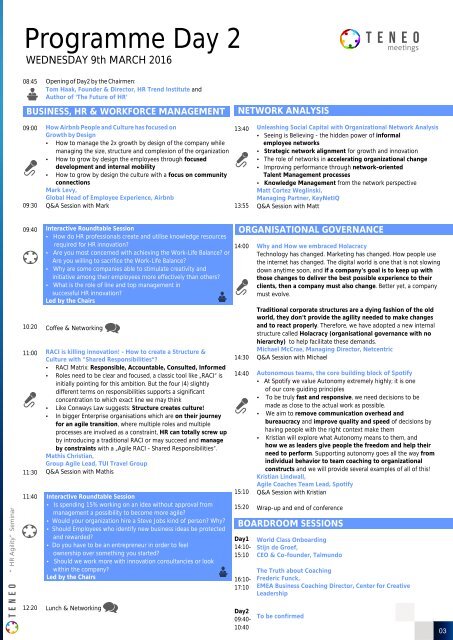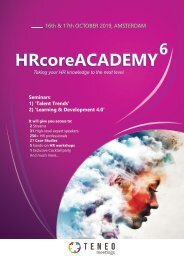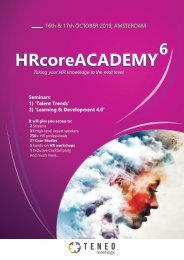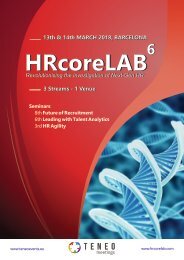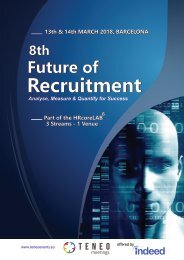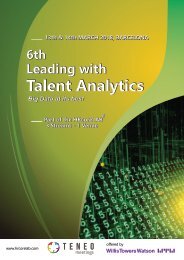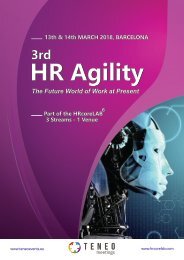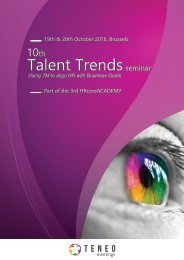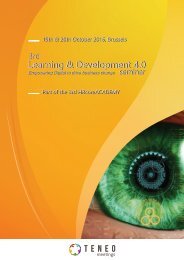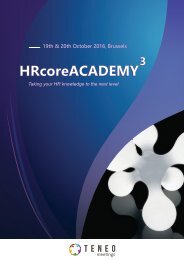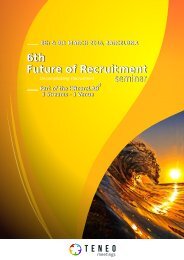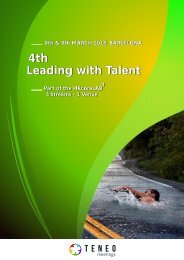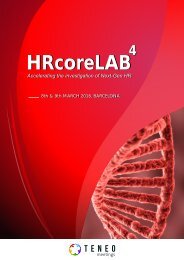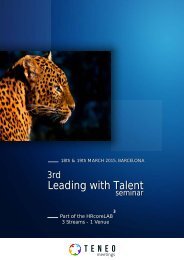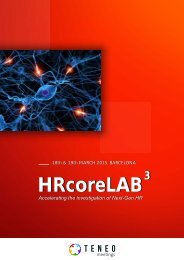HRAgility-Barcelona
Create successful ePaper yourself
Turn your PDF publications into a flip-book with our unique Google optimized e-Paper software.
Programme Day 2<br />
WEDNESDAY 9th MARCH 2016<br />
08:<br />
45<br />
BUSINESS, HR & WORKFORCE MANAGEMENT<br />
s<br />
09:<br />
00<br />
s<br />
09:<br />
30<br />
Opening of Day2 by the Chairmen:<br />
Tom Haak, Founder & Director, HR Trend Institute and<br />
Author of ‘The Future of HR’<br />
How Airbnb People and Culture has focused on<br />
Growth by Design<br />
How to manage the 2x growth by design of the company while<br />
managing the size, structure and complexion of the organization<br />
How to grow by design the employees through focused<br />
development and internal mobility<br />
How to grow by design the culture with a focus on community<br />
connections<br />
Mark Levy,<br />
Global Head of Employee Experience, Airbnb<br />
Q&A Session with Mark<br />
NETWORK ANALYSIS<br />
s<br />
13:40<br />
s<br />
13:55<br />
Unleashing Social Capital with Organizational Network Analysis<br />
Seeing is Believing - the hidden power of informal<br />
employee networks<br />
Strategic network alignment for growth and innovation<br />
The role of networks in accelerating organizational change<br />
Improving performance through network-oriented<br />
Talent Management processes<br />
Knowledge Management from the network perspective<br />
Matt Cortez Weglinski,<br />
Managing Partner, KeyNetIQ<br />
Q&A Session with Matt<br />
“HR Agility”Seminar<br />
09:40<br />
10:20<br />
s<br />
11:00<br />
s<br />
11:30<br />
11:40<br />
s<br />
12:20<br />
Interactive Roundtable Session<br />
How do HR professionals create and utilise knowledge resources<br />
required for HR innovation?<br />
Are you most concerned with achieving the Work-Life Balance? or<br />
Are you willing to sacrifice the Work-Life Balance?<br />
Why are some companies able to stimulate creativity and<br />
initiative among their employees more effectively than others?<br />
What is the role of line and top management in<br />
successful HR innovation?<br />
Led by the Chairs<br />
Coffee & Networking<br />
RACI is killing innovation! - How to create a Structure &<br />
Culture with "Shared Responsibilities“?<br />
RACI Matrix: Responsible, Accountable, Consulted, Informed<br />
Roles need to be clear and focused, a classic tool like „RACI“ is<br />
initially pointing for this ambition. But the four (4) slightly<br />
different terms on responsibilities supports a significant<br />
concentration to which exact line we may think<br />
Like Conways Law suggests: Structure creates culture!<br />
In bigger Enterprise organisations which are on their journey<br />
for an agile transition, where multiple roles and multiple<br />
processes are involved as a constraint, HR can totally screw up<br />
by introducing a traditional RACI or may succeed and manage<br />
by constraints with a „Agile RACI - Shared Responsibilities“.<br />
Mathis Christian,<br />
Group Agile Lead, TUI Travel Group<br />
Q&A Session with Mathis<br />
Interactive Roundtable Session<br />
Is spending 15% working on an idea without approval from<br />
management a possibility to become more agile?<br />
Would your organization hire a Steve Jobs kind of person? Why?<br />
Should Employees who identify new business ideas be protected<br />
and rewarded?<br />
Do you have to be an entrepreneur in order to feel<br />
ownership over something you started?<br />
Should we work more with innovation consultancies or look<br />
within the company?<br />
Led by the Chairs<br />
Lunch & Networking<br />
14:00<br />
s<br />
14:30<br />
14:40<br />
s<br />
ORGANISATIONAL GOVERNANCE<br />
15:10<br />
s<br />
15:20<br />
Day1<br />
14:10-<br />
15:10<br />
16:10-<br />
17:10<br />
Day2<br />
09:40-<br />
10:40<br />
Why and How we embraced Holacracy<br />
Technology has changed. Marketing has changed. How people use<br />
the internet has changed. The digital world is one that is not slowing<br />
down anytime soon, and if a company's goal is to keep up with<br />
those changes to deliver the best possible experience to their<br />
clients, then a company must also change. Better yet, a company<br />
must evolve.<br />
Traditional corporate structures are a dying fashion of the old<br />
world, they don't provide the agility needed to make changes<br />
and to react properly. Therefore, we have adopted a new internal<br />
structure called Holacracy (organisational governance with no<br />
hierarchy) to help facilitate these demands.<br />
Michael McCrae, Managing Director, Netcentric<br />
Q&A Session with Michael<br />
Autonomous teams, the core building block of Spotify<br />
At Spotify we value Autonomy extremely highly; it is one<br />
of our core guiding principles<br />
To be truly fast and responsive, we need decisions to be<br />
made as close to the actual work as possible.<br />
We aim to remove communication overhead and<br />
bureaucracy and improve quality and speed of decisions by<br />
having people with the right context make them<br />
Kristian will explore what Autonomy means to them, and<br />
how we as leaders give people the freedom and help their<br />
need to perform. Supporting autonomy goes all the way from<br />
individual behavior to team coaching to organizational<br />
constructs and we will provide several examples of all of this!<br />
Kristian Lindwall,<br />
Agile Coaches Team Lead, Spotify<br />
Q&A Session with Kristian<br />
Wrap-up and end of conference<br />
BOARDROOM SESSIONS<br />
World Class Onboarding<br />
Stijn de Groef,<br />
CEO & Co-founder, Talmundo<br />
The Truth about Coaching<br />
Frederic Funck,<br />
EMEA Business Coaching Director, Center for Creative<br />
Leadership<br />
To be confirmed<br />
03


